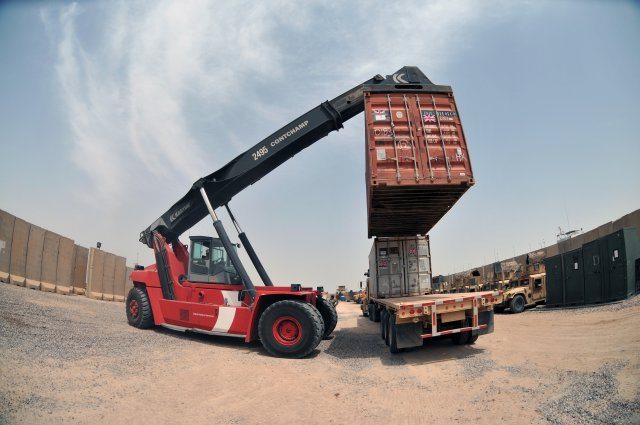Another chapter in the responsible drawdown of Iraq has ended.
On May 16, 2011, the 1244th Transportation Company from North Riverside, Ill., along with the 230th Sustainment Brigade’s Personnel Security Detail, headquartered out of Chattanooga, Tenn., took a trip to Umm Qasr, Iraq, to transport the last remaining British soldiers and their equipment out of Iraq.
British officials asked the U.S. Army to augment their efforts with this daunting task because they did not have the full compliment of assets to complete this mission on their own. Upon receipt of the mission, the Tennessee Army National Guard brigade made direct contact with the British liaison officer to plan, coordinate and implement the necessary assets to accomplish the request.
When asked ‘why the 230th,’ Lt. Col. Martin J. Basham, executive officer of the brigade, replied, “(The 230th Sustainment Brigade) are the guys that move all the stuff out of the country.”
One of the 230th’s missions is to help facilitate the drawdown and complete withdrawal of U.S. forces from Iraq by the end of 2011.
“We are the haul assets,” continued Basham. “Not only do we haul stuff out of Iraq, we also sustain the units currently there. We also handle all the equipment and people as it goes in or out of Iraq.”
“This mission is very historic. Not only are we helping the British leave Iraq, but where they are coming out of Iraq is only a few miles from where they initially entered Iraq back in 2003,” said Capt. Shawn D. Nokes, company commander of the Illinois Army National Guard’s 1244th Transportation Company and Quincy, Ill. native.
For the 1244th, this is just another mission, not unlike any other they have undertaken. They go somewhere, pick up a load, then transport it and drop it off.
“This one is a little more intricate,” said Staff Sgt. Shelly R. Johns, a convoy commander for the 1244th, “(and) a little more detailed. Our job is to pick up something and take it where it needs to go. This one was a little more detailed, working with other countries and their operating procedures.
The hardest part was just coordinating between different countries and contractors,” said Johns.
“It was a privilege and an honor for the 1244th to not only be a part of the United Kingdom extraction mission, but to meet and get to know some of our coalition’s British counterparts. We are humbled to be part of this historic piece and have the opportunity to work with our British comrades,” said Nokes.
“Staff Sergeant Johns and her crew executed in an exemplary fashion navigating through rough terrain and tight congested areas to pick up and deliver the loads,” Nokes said. “Job well done.”










